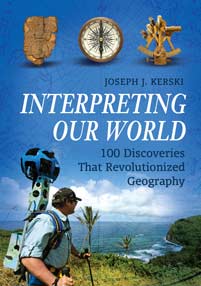This important book demonstrates why geography matters in the modern-day world through its examination of 100 moments throughout history that had a significant impact on the study of geography—literally, “writing about the earth.”
Geography is not simply accounts of the lands of earth and their features; it’s about discovering everything there is to know about our planet. This book shows why geography is of critical importance to our world’s 21st-century inhabitants through an exploration of the past and present discoveries that have been made about the earth. It pinpoints 100 moments throughout history that had a significant impact on the study of geography and the understanding of our world, including widely accepted maps of the ancient world, writings and discoveries of key thinkers and philosophers, key exploration events and findings during the Age of Discovery, the foundations of important geographic organizations, and new inventions in digital mapping today.
The book begins with a clear explanation of geography as a discipline, a framework, and a way of viewing the world, followed by coverage of each of the 100 discoveries and innovations that provides sufficient background and content for readers to understand each topic. The book concludes with a concise synopsis of why it all matters and a look forward to 10 possible future discoveries in the next 50 years of geography. Students will gain a clear sense of what is truly revolutionary about geography, perhaps challenging their preconceived notion of what geography actually is, and grasp how important discoveries revolutionized not only the past but the present day as well.
Features
- Provides readers with an understanding of why geography matters to our 21st-century world and an awareness of how geography affects our everyday lives and is key to wise decision making
- Addresses and explains key themes of geography, including scale, physical processes, cultural processes, patterns, relationships, models, and trends
- Integrates time, space, and place in geography, documenting how it is not only the study of spatial patterns, but also the fact that many discoveries in geography came about because of the particular time and place in which the discoverers lived





